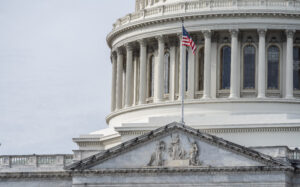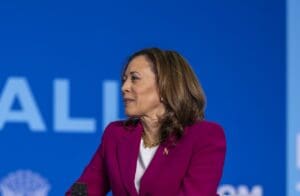Budget Reconciliation: Tracking the 2025 Trump Tax Cuts
Our experts are providing the latest details and analysis of proposed federal tax policy changes.
16 min readDr. William McBride is the Chief Economist & Stephen J. Entin Fellow in Economics at the Tax Foundation, where he oversees major research projects primarily related to reforming the federal tax code, advancing sound tax policy, and improving the federal government’s fiscal outlook.
Dr. McBride has more than ten years of experience analyzing a variety of economic and policy issues. At the Tax Foundation he has served as the Vice President of Federal Tax Policy, leading our efforts to research, model, and reform the U.S. tax code, and as Chief Economist, researching the economics of taxation and guiding the development of the Tax Foundation dynamic scoring model. From 2015 to 2020 he was a manager in the National Economic and Statistics (NES) group at PwC where he worked on a wide array of projects including economic impact analyses, industry surveys, U.S. federal and state tax revenue estimates, and issues related to tax reform at the state, federal, and international levels.
Dr. McBride holds a PhD in economics from George Mason University, where he specialized in macroeconomics and agent-based modeling. His research has been cited by policymakers, quoted by major media outlets, including The Wall Street Journal and The New York Times, and published in scholarly journals, such as the National Tax Journal, Public Budgeting & Finance, and Tax Notes.

Our experts are providing the latest details and analysis of proposed federal tax policy changes.
16 min read
Senate Republicans have advanced legislation to extend many provisions of the 2017 Tax Cuts and Jobs Act (TCJA) alongside dozens of new provisions, following broadly similar legislation put forward by House Republicans.
8 min read
Lawmakers are right to be concerned about deficits and economic growth. The best path to address those concerns is to ensure OBBB provides permanent full expensing of capital investment, avoids inefficient tax cuts, and offsets remaining revenue losses by closing tax loopholes and reducing spending.
8 min read
Our preliminary analysis finds the tax provisions increase long-run GDP by 0.8 percent and reduce federal tax revenue by $4.0 trillion from 2025 through 2034 on a conventional basis before added interest costs.
9 min read
The House tax and spending bill leaves in place a long-standing provision that exempts credit unions from federal and state income tax, allowing them to compete unfairly with banks and, increasingly, to buy them.
6 min read
As lawmakers consider options for budgetary offsets, they should prioritize competitiveness and economic growth, as a heavier corporate tax burden will undermine the core purpose and achievement of the TCJA.
24 min read
In a perilous economic and fiscal environment, with instability created by Trump’s trade war and publicly held debt on track to surpass the highest levels ever recorded within five years, a lot rides on how Republicans navigate tax and spending reforms in reconciliation.
6 min read
The House Budget Committee has released a budget resolution that specifies large reductions in both taxes and spending over the next decade, paving the way to extend the expiring provisions of the Tax Cuts and Jobs Act (TCJA) and potentially cut other taxes.
6 min read
As Republicans look for ways to offset the budgetary cost of extending the expiring provisions of the Tax Cuts and Jobs Act (TCJA) and potentially enacting other tax cuts, the latest estimates indicate several trillion dollars could be raised by reducing tax credits and other preferences in the tax code.
5 min read
Given the poor state of the budget process and worsening debt trajectory, lawmakers should move boldly and quickly to address the issue, including via a fiscal commission process. Issues to consider should include reforms to both spending and taxes.
42 min read
The analysis provides key insights into how their models work and the sort of outputs we can expect from their models as part of next year’s tax debate.
8 min read
Taxes and their broader impact are generally overlooked in American education. Taxes influence earnings, budgets, voting, and decisions on where to live, but do American taxpayers understand the US tax system?
25 min read
Fiscal pressures are likely to weigh heavily on lawmakers as they craft a tax reform package. That increased pressure could result in well-designed tax reform that prioritizes economic growth, simplicity, and stability, or it could encourage budget gimmicks and economically harmful offsets. Lawmakers should avoid the latter.
8 min read
On tax policy, Harris carries forward much of President Biden’s FY 2025 budget, including higher taxes aimed at businesses and high earners. She would also further expand the child tax credit (CTC) and various other tax credits and incentives while exempting tips from income tax.
17 min read
While federal tax collections—especially corporate taxes—have reached historically high levels, these gains have not kept pace with escalating spending, particularly on debt interest, leading to a substantial and concerning budget deficit in FY24.
6 min read
A new analysis finds that the tax increase would reduce average wages by as much as $597 per US worker each year. In some states, the drop in wages would exceed $700 per worker.
4 min read
As part of the 2024 presidential campaign, Vice President Kamala Harris is proposing to tax long-term capital gains at a top rate of 33 percent for high earners, taking the top federal rate to highs not seen since the 1970s.
3 min read
Lawmakers should consider compliance costs—not just tax liabilities—when evaluating reforms to business income taxation.
22 min read
President Biden is proposing extraordinarily large tax hikes on businesses and the top 1 percent of earners that would put the US in a distinctly uncompetitive international position and threaten the health of the US economy.
19 min read
Lawmakers should see 2025 as an opportunity to consider more fundamental tax reforms. While the TCJA addressed some of the deficiencies of the tax code, it by no means addressed them all.
8 min read